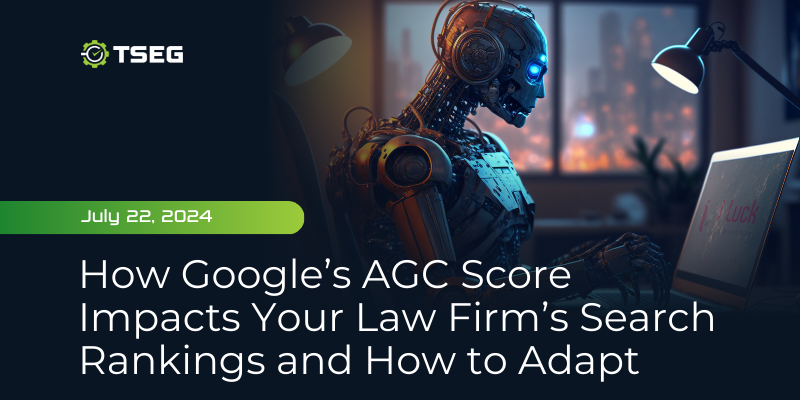How Google’s AGC Score Impacts Your Law Firm’s Search Rankings and How to Adapt
Posted on Monday, July 22nd, 2024 at 6:23 pm
Understanding Google’s AGC Classification Score
AGC is a term that can refer to Artificially Generated Content, Automatically Generated Content, and/or AI Generated Content. Recent insights have brought to light Google’s use of an AGC classification score, designed to identify and manage content generated through automated means. This score is part of Google’s broader effort to maintain the quality and integrity of its search results.
Background on AGC Classification
The concept of AGC classification was highlighted following a series of document leaks, which revealed various internal metrics used by Google to evaluate content. These leaks suggest that the AGC score is employed to flag content that may lack originality and substantial value. Google’s reticence to provide specific details on the AGC classification aims to prevent misuse and manipulation by bad actors.

Impact on Search Rankings
The AGC classification score is crucial for determining a website’s visibility on Google. Content identified as artificially generated can experience significant drops in rankings, reducing exposure to users. This underscores Google’s commitment to prioritizing high-quality, original content over content created primarily for SEO purposes.
Document Leak Insights
Leaked documents suggest that the AGC score is a key metric in Google’s toolkit for combating low-quality content. While the specifics of its operation remain unconfirmed, its existence underscores Google’s strategy to enhance user experience by surfacing the most relevant and valuable content in search results.
The recent leaks highlighted in our blog post Google’s Search Leak for Law Firm Websites emphasize the importance of understanding Google’s search algorithms and classifications. These insights are vital for law firms aiming to maintain and improve their search rankings.
Implications for Law Firms
The AGC classification score’s impact on legal websites is significant, affecting search visibility and client acquisition. Law firms must be vigilant about the potential risks associated with content flagged as artificially generated. Relying on low-quality automated content can lead to substantial ranking drops, decreasing visibility in search results and hindering client acquisition.
An example of AI-generated content being identified:

To avoid penalties, law firms should implement rigorous content standards:
- Originality: Ensuring all content is unique and tailored to the firm’s expertise and client needs.
- Relevance: Regularly updating content to reflect the latest legal developments and industry trends.
- Credibility: Providing well-researched, factually accurate content that establishes the firm as a trusted authority in its field.
Sustaining Quality Content
Maintaining high-quality content starts with understanding your audience’s needs. Detailed audience research helps create targeted content that addresses specific legal concerns and questions, increasing relevance and engagement. A content calendar can help plan the regular release of fresh, pertinent information, keeping the website active and valuable.
Improving the user experience is also crucial. Optimize website performance for fast loading times, mobile compatibility, and intuitive navigation. Enhancing user experience satisfies visitors and aligns with Google’s ranking factors. Incorporating interactive elements like videos and infographics can further enrich the user experience.
Analytics are vital for sustaining content quality. Regularly monitor key metrics like page views, bounce rates, and session durations to gain insights into which content performs best and identify areas for improvement. Adjusting content strategies based on these insights ensures the firm continually meets audience needs and adheres to Google’s quality guidelines.
TSEG’s expertise in legal digital marketing ensures that your firm’s content meets Google’s quality standards and effectively engages potential clients. Our commitment to producing original, valuable content and understanding Google’s metrics helps optimize your law firm’s marketing, and achieve your business goals. Let TSEG help your firm be the best it can be.
